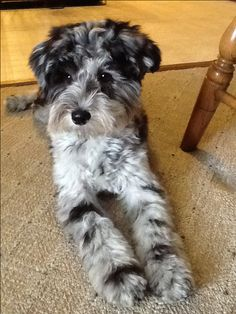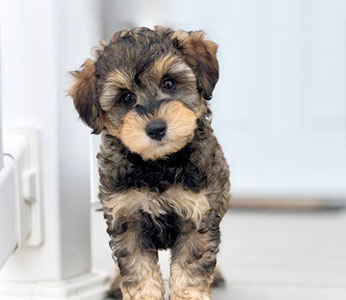Mini Schnoodle Breed Information


Looking for a loyal, intelligent, and hypoallergenic dog? The Mini Schnoodle is a top choice for dog lovers, thanks to its playful personality and low-shedding coat. This designer breed is a mix between the Miniature Schnauzer and Miniature Poodle. It combines the best features of both parent breeds into one delightful package. Their compact size makes them perfect for apartment living, but they’re also energetic enough for homes with yards.
Mini Schnoodles are known for being affectionate and easily trainable, which makes them fantastic family pets. They thrive on human interaction, so if you’re looking for a dog that’s eager to please and full of energy, the Mini Schnoodle might just be the perfect match for your home.
Characteristics
- Highly Intelligent: Mini Schnoodles are smart dogs that pick up new commands and tricks easily.
- Small Dog: Typically weighing 10-20 pounds, Mini Schnoodles are great for apartment living or smaller homes.
- Moderately Energetic Breed: Despite their size, Mini Schnoodles have plenty of energy and love daily walks or play sessions.
- Hypoallergenic Coat: Their low-shedding fur makes them ideal for households with allergy sufferers.
- Gets Along with Other Pets: When socialized early, Mini Schnoodles adapt well to living with other pets.
- Great Family Pet: Their affectionate nature makes them wonderful companions for families, particularly those with children.
- Adaptable to Any Space: Whether you live in a large home or an apartment, Mini Schnoodles can adapt easily.

Appearance
The Mini Schnoodle is a small dog, typically weighing between 10 and 20 pounds. With an average height of 12 to 15 inches, they have a sturdy yet compact build, which allows them to enjoy various activities without taking up too much space. Their adaptable size is one of the reasons the Mini Schnoodle is popular among dog lovers in urban and suburban settings.
Known for their hypoallergenic coat, Mini Schnoodles usually have fur that is either curly or wavy (inherited from their Poodle parent). This low-shedding coat is perfect for allergy sufferers, as it produces less dander than other breeds. The coat comes in various colors, including black, white, gray, and brown, with some Mini Schnoodles displaying multi-colored or parti-colored patterns. Regular grooming is essential to keep their coat looking its best, as it can become matted if not maintained properly.
Their expressive face is one of their most endearing traits. The Mini Schnoodle often inherits the Schnauzer’s characteristic beard and eyebrows, which gives them a distinctive and alert appearance. Their dark, intelligent eyes further enhance their expressive nature.
Temperament
Mini Schnoodles are known for their friendly, affectionate nature, which means they are ideal companions for families, singles, and seniors alike. Their intelligence, inherited from both the Miniature Poodle and Miniature Schnauzer, means they are highly trainable and responsive to commands. This trait also means they need regular mental stimulation to stay happy and well-behaved.
In addition to being loyal and loving, Mini Schnoodles are protective, often alerting their owners to any unfamiliar sounds or visitors. They generally get along well with children and other pets when socialized early, but they can be cautious around strangers at first. Overall, their temperament strikes a perfect balance between playful and attentive, which makes them a popular choice for those looking for a family-friendly dog.
Care
Grooming
Regular grooming is essential for Mini Schnoodles due to their low-shedding, hypoallergenic coat. Their fur, which is often curly or wavy, requires brushing at least two to three times a week to prevent matting and keep it looking neat. Consistent brushing also helps maintain the coat’s softness and reduces the risk of tangles, especially in longer-haired Mini Schnoodles.
In addition to brushing, Mini Schnoodles should be professionally groomed every 6 to 8 weeks. Popular grooming styles include the “teddy bear” cut and the Schnauzer trim. These cuts not only keep the dog looking cute but also prevent the coat from becoming too long, which can lead to discomfort. Regular ear cleaning is also recommended, as their floppy ears are prone to moisture buildup and infections.
Owners should also pay attention to nail trimming and dental care. Mini Schnoodles need their nails trimmed every few weeks to avoid overgrowth, which can cause discomfort or even injury. Regular brushing of their teeth—at least two to three times a week—can help prevent plaque buildup and dental issues.
Exercise Needs
Mini Schnoodles are playful dogs that need daily exercise to stay healthy and happy. On average, they require 30 to 45 minutes of physical activity each day, which can include walking, running, or playing in a secure area. Their compact size makes them well-suited for apartment living, as long as they get sufficient outdoor activity to burn off their energy.
In addition to physical exercise, Mini Schnoodles benefit from mental stimulation due to their high intelligence. Puzzle toys, interactive games, and obedience training are excellent ways to keep their minds sharp and prevent boredom. Without enough stimulation, they may develop unwanted behaviors like chewing or excessive barking, as they need both mental and physical engagement.
Health
Mini Schnoodles are generally healthy dogs, but there are a few mild health issues owners should be aware of. One common concern is dental health. Like many small dog breeds, Mini Schnoodle dogs are prone to plaque buildup and gum disease if their teeth aren’t regularly brushed. Providing dental chews and scheduling regular cleanings can help keep their teeth and gums healthy.
Ear infections can be a concern, especially for Mini Schnoodles with floppy ears. Regular cleaning of their ears will help prevent moisture or debris from getting trapped and causing irritation.
Lifespan
Mini Schnoodles are known for their impressive lifespan, typically living between 12 and 16 years. With proper care, including regular vet visits and a healthy diet, many Mini Schnoodles live long, healthy lives. Longevity in this breed is often a key popularity point, as families look for dogs that will be around for many years.
Training
Mini Schnoodles are known for their intelligence and trainability. Early training is important to establish good behaviors, and using positive reinforcement like treats and praise will yield the best results. Mini Schnoodles quickly learn basic commands such as “sit,” “stay,” and “come,” but they also excel in more advanced training and agility exercises.
Consistency is key when training a Mini Schnoodle. Short, fun sessions will keep them engaged without overwhelming them. These dogs are eager to learn but can sometimes be distracted due to their playful nature, so regular practice helps solidify their learning. Avoid harsh training methods, as Mini Schnoodles respond best to gentle, encouraging techniques.
Socialization is another essential aspect of training. By exposing your Mini Schnoodle puppy to different environments, people, and other dogs early on, you help them become a well-adjusted, confident pet. Since they can be naturally cautious around strangers, early socialization helps reduce anxiety and builds their comfort in new situations.
History
The Mini Schnoodle is a designer breed that was created in the 1980s by crossing a Miniature Schnauzer with a Miniature Poodle. This combination was intended to bring together the best of both breeds—intelligence, a hypoallergenic coat, and a playful personality. Breeders aimed to develop a dog that would suit families, allergy sufferers, and anyone looking for a loyal, trainable pet.
As a result, the Mini Schnoodle has become a popular choice for those seeking a hypoallergenic dog with low-shedding fur. Known for its adaptability and friendly nature, this breed inherited the protective instincts of the Schnauzer and the high intelligence of the Poodle, making it perfect for households of all kinds. Over time, the Mini Schnoodle has gained significant attention as a versatile, easy-to-train companion.

